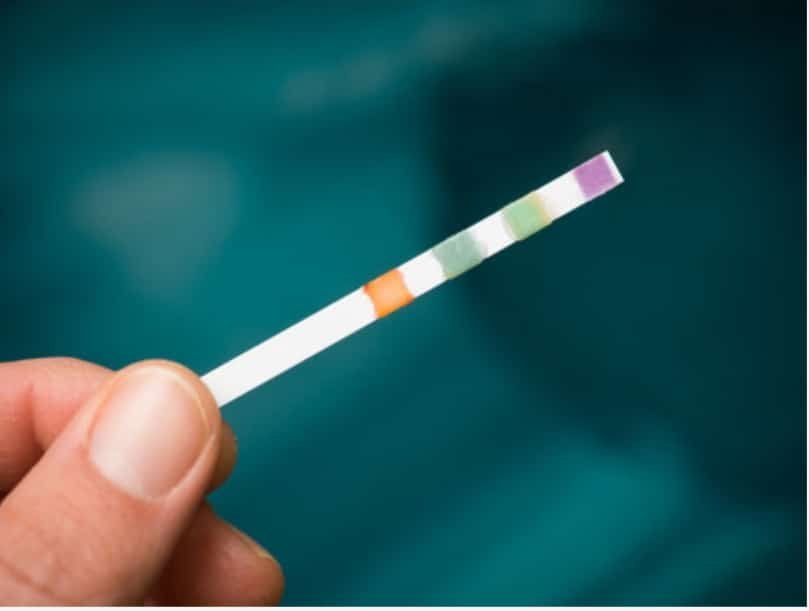A pregnancy test can confirm if a woman is pregnant. You can use the test strip at home or in the doctor’s office.
A pregnancy test is around 99 percent reliable.
If you’re trying to figure out how to use a pregnancy test strip, rest assured that you’ll learn everything you need to know about doing a pregnancy test at home.
What is a pregnancy test strip?

Pregnancy test strips are excellent for confirming pregnancies in the early stages. The strips are used in conjunction with a person’s urine to check for the level of the human Chorionic Gonadotropin (hCG). You can confirm a pregnancy as early as two weeks after fertilization.
Test strips are very easy to use, and you can get instructions on how to use a pregnancy test strip just by reading the instructions on the pack.
When Can I Take It?
The earliest time for taking a home urine test is 14 days after possible conception, but waiting until a missed period will give a more reliable result.
Some tests on the market can be taken earlier. This depends on how sensitive they are.
It is important to read the package insert to know the best and earliest time to take the test.
The best time of day to take a urine pregnancy test is first thing in the morning, after waking.
This is because consuming a lot of liquids before taking the test, can lead to a false negative, even if the woman is pregnant.
HOW TO USE PREGNANCY TEST STRIPS?

Pregnancy test is a quick test method that is also known as One Step HCG Urine Test which you can manually without any difficulty.
Pregnancy test strips check the presence of HCG (human chorionic gonadotropin), which comes in urine very early for the duration of pregnancy. There are some steps for using test strips which are very useful for women.
Most (if not all) pregnancy test strips look and work the same, so you can use this instruction for your home pregnancy test no matter where you are from. Here is how to do pregnancy test at home:
- The BFP Pregnancy Test can be performed at any time of the day; however, testing first-morning urine is preferable.
- Urinate into a clean, dry cup or container/bowl.
- Remove the testing device from the foil pouch by tearing at the notch. Hold the strip at the colored end. (Do not touch the arrow end; do not touch the test window/the middle part of the strip)
- Holding the strip vertically, immerse the end of the strip with the arrows into the specimen. Do not immerse past the MAX line.
- Take the strip out when the sample has migrated to the test window (at least 5 seconds). Lay the strip (MAX side facing up) flat on a clean, dry, non-absorbent surface.
When you see a coloured solution moving around the test strip, do not panic. It is supposed to happen. Once the time has passed, you should be able to see your results more or less clearly. Continue reading to find out how to interpret the pregnancy test strip results.
How to read your result
1 Line = Negative
If only 1 colored line appears as the control line, the test is negative and you can assume you are not pregnant.
2 Lines = Positive
If 2 colored lines appear, 1 as the testing line and 1 as the control line, the test is positive and you can assume you are pregnant. Even if the lines are very light in color, you can still assume you are pregnant.
Invalid Results
If the control line does not appear, the test is invalid. Invalid results may be an indication that the test strip was not thoroughly saturated in urine. In this case, re-dip the test for at least 5 seconds and wait 10 minutes to read the results. If there is still no control line, the test is invalid and you should retest the following day. Each test is designed for single-use and should not be reused.
NOTE:
A positive result (2 Lines) indicates that your urine contains hCG (human Chorionic Gonadotropin) and you can assume you are pregnant. You should consult your doctor who is best able to further advise you on proper prenatal care. If you are taking medication, telephone him or her immediately and make sure it is safe for your baby.
A negative result (1 Line in the “Control Zone” ) means that no hCG has been detected and you can assume you are not pregnant. If a week passes and your menstrual period is still delayed, you should do another BFP Pregnancy Test. If the result is still negative in the later test, there is little chance that you are pregnant. However, because there could be health-related reasons why you are not menstruating, you should see your doctor without delay.
If your menstrual cycle is irregular, it can be difficult to know the day you have missed your period. If your test indicated you are not pregnant and your menstrual cycle does not begin within a few days, you may have miscalculated your cycle and should use a second BFP Pregnancy Test.
CONCLUSION
Pregnancy strips have a high success rate. However, you must follow the instructions on the package so you can get an accurate reading.
Have you tries it before? Share your experience with us in the comments section.

